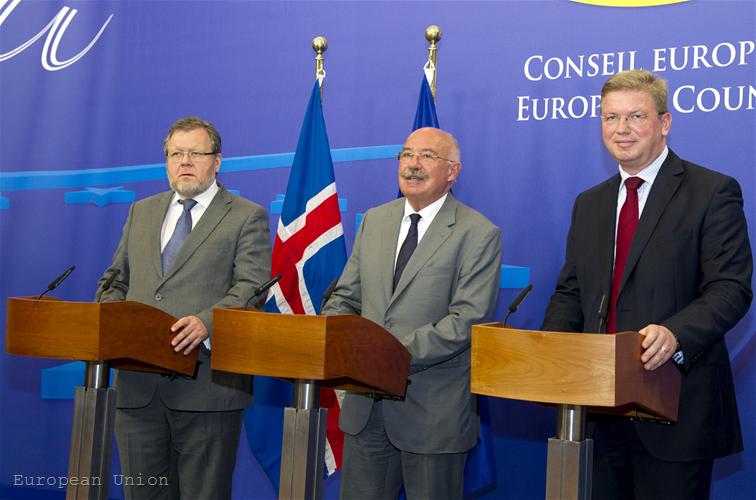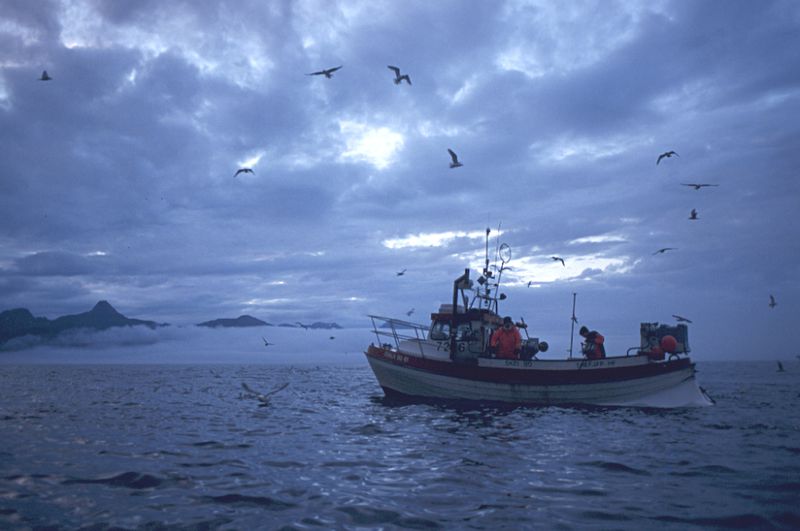EP: Iceland's EU membership will help the Union geopolitically
Adelina Marini, July 10, 2010
 The European Parliament endorsed on Wednesday a resolution, welcoming the decision of the European Council from June 17 giving Iceland a green light to start EU accession negotiations. According to the rapporteur of the resolution, the Romanian MEP Cristian Dan Preda (EPP), Iceland's membership to the European Union will help the Union play a more active role in the Arctic region. In the same time, the MEPs insist the dispute about payment of compensations to the governments of Britain and the Netherlands, because of the bankrupt bank Icesave, to be solved on a bilateral basis.
The European Parliament endorsed on Wednesday a resolution, welcoming the decision of the European Council from June 17 giving Iceland a green light to start EU accession negotiations. According to the rapporteur of the resolution, the Romanian MEP Cristian Dan Preda (EPP), Iceland's membership to the European Union will help the Union play a more active role in the Arctic region. In the same time, the MEPs insist the dispute about payment of compensations to the governments of Britain and the Netherlands, because of the bankrupt bank Icesave, to be solved on a bilateral basis.
Beside this Iceland should stop whaling and withdraw all of its objections, filed with the International Whaling Committee.
The details
The recommendation Iceland to solve its bilateral issues with Britain and the  Netherlands with regard to Icesave, is based on an official letter from May 26 2010 of the Surveillance Authority of the European Free Trade Association. According to the letter, "Iceland is obliged to ensure payment of the minimum compensation to Icesave depositors in the United Kingdom and the Netherlands". In a referendum on March 6, 2010 the Icelanders rejected the plan for payments after the bankruptcy of Icesave.
Netherlands with regard to Icesave, is based on an official letter from May 26 2010 of the Surveillance Authority of the European Free Trade Association. According to the letter, "Iceland is obliged to ensure payment of the minimum compensation to Icesave depositors in the United Kingdom and the Netherlands". In a referendum on March 6, 2010 the Icelanders rejected the plan for payments after the bankruptcy of Icesave.
The problem with the bank is that a lot of Dutch and British depositors, whose savings were guaranteed by the governments, respectively of the Netherlands and Britain. Last week the Ministry of Finance of Iceland announced that the trilateral negotiations between the governments of Iceland, Britain and the Netherlands had started. The talks were frozen on March 5 on the eve of the referendum. The results of the new round of talks are still not available.
 With regard to fisheries, the MEPs admit that Iceland manages in a responsible and sustainable way its marine resources but insist the country to endorse the European Common Fisheries Policy in order to achieve mutual satisfactory solution, based on the best practices and protecting the interests both of the fisheries industries and the consumers in the EU and Iceland. However, this is in a serious contradiction with Reykjavik's visions. Iceland considers the Common Fisheries Policy as ineffective and harmful to competitiveness.
With regard to fisheries, the MEPs admit that Iceland manages in a responsible and sustainable way its marine resources but insist the country to endorse the European Common Fisheries Policy in order to achieve mutual satisfactory solution, based on the best practices and protecting the interests both of the fisheries industries and the consumers in the EU and Iceland. However, this is in a serious contradiction with Reykjavik's visions. Iceland considers the Common Fisheries Policy as ineffective and harmful to competitiveness.
In this sense sounds the criticism of the Green MEP, the Scot Ian Hudghton. He says that the moves to force Iceland to radically alter its approach to fisheries policy as part of its bid for EU membership, are contradictory. "The EU would do better to learn from Iceland's successful management of its marine resources rather than conforming with the current failed Common Fisheries Policy", the MEP thinks. He adds that the EU should not dictate Iceland conditions because this would be counterproductive.
According to the government of Iceland and the fisheries industries in the  country, this is the sector where Iceland is doing best, given it needs no subsidies at all. Unlike the fisheries in the EU which rely mainly on the state. And regarding whaling, Iceland's main argument against an overall prohibition, is that it had introduced a reasonable policy, aimed at controlling whales' population in a sustainable, taking also care of the quantities of fish catch are also kept. According to Iceland, whaling is necessary to some extent because whales threaten fish catches, which is essential for the economy of the country.
country, this is the sector where Iceland is doing best, given it needs no subsidies at all. Unlike the fisheries in the EU which rely mainly on the state. And regarding whaling, Iceland's main argument against an overall prohibition, is that it had introduced a reasonable policy, aimed at controlling whales' population in a sustainable, taking also care of the quantities of fish catch are also kept. According to Iceland, whaling is necessary to some extent because whales threaten fish catches, which is essential for the economy of the country.
 And again the group of the Greens in the European Parliament supported a call in the resolution Iceland to stop whaling. "This is a great result for all those who have campaigned long and hard against whaling all over the world. This resolution sends a strong signal that if Iceland is serious about membership of the European Union, it must respect international standards", said after the vote the Finnish MEP from the group of the Greens/European Free Alliance Heidi Hautala and the Estonian representative Indrek Tarand.
And again the group of the Greens in the European Parliament supported a call in the resolution Iceland to stop whaling. "This is a great result for all those who have campaigned long and hard against whaling all over the world. This resolution sends a strong signal that if Iceland is serious about membership of the European Union, it must respect international standards", said after the vote the Finnish MEP from the group of the Greens/European Free Alliance Heidi Hautala and the Estonian representative Indrek Tarand.
And about uncertainty how serious Iceland's intentions are to join the EU, speaks the call in the resolution the country's government to initiate a broad public debate, during which a serious attention to be paid to Icelanders' concerns from EU membership. As you know from euinside's stories from Reykjavik, the society in the island country is divided on the accession issue, and the opponents of membership are prevailing so far.
The European Parliament makes in its resolution a very thorough analysis of Iceland's accession application. According to the analysis, Iceland is at an advanced stage of compliance with the requirements of 10 of the negotiating chapters and partly fulfills the requirements of 11 chapters, leaving only 12 chapters to be negotiated in full. A special attention is paid to the economic criteria and most of all - financial supervision.
No matter the disputes on fisheries which will probably be central during the  accession process , it is a good news that the MEPs call on the European Commission to invite Iceland to join the current debates on the reform of the Common Agricultural Policy. Agriculture's share in the country is small and this is why it needs serious support.
accession process , it is a good news that the MEPs call on the European Commission to invite Iceland to join the current debates on the reform of the Common Agricultural Policy. Agriculture's share in the country is small and this is why it needs serious support.
In the autumn the European Commission is expected to start the obligatory screening process before the negotiations start. During this process a full review of Iceland's legislation is being made with regard to which part of it had already been harmonized with the European acquis and which not. Then the real negotiations process starts chapter by chapter, which will probably happen next year.
One of the main aims of the country is through an EU membership to secure joining the eurozone - a stage, which will for sure take much more time.
 | © European Union
| © European Union | © Larus Karl Ingason
| © Larus Karl Ingason | © euinside
| © euinside